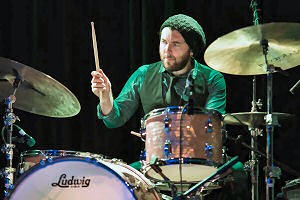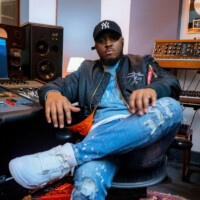 Playing a seemingly simple groove over many minutes while giving it a great feel, sound and intention has always been one of the hardest tasks behind the drum kit. That’s why Blues has always been home to some of the grooviest drummers in the scene.
Playing a seemingly simple groove over many minutes while giving it a great feel, sound and intention has always been one of the hardest tasks behind the drum kit. That’s why Blues has always been home to some of the grooviest drummers in the scene.
Four times winner of ‘Drummer of the Year’ in the British Blues Awards, inducted into the Hall Of Fame and three times Drummer Of The Year in the Blues Matters magazine are certain proof that Wayne Proctor fits right in and is one of the hottest Blues and groove drummers the UK has to offer. Besides touring and recording with pretty much everyone in the scene, Wayne co-runs a recording studio in the Nottinghamshire countryside.
I caught up with Wayne during his current UK Tour with King King to talk about his path, his work and his key to success.
How did it all start?
When I was a kid, the first instrument I played was piano, but then gravitated towards guitar when I was about 7 or 8 years old. It was when I was having guitar lesson one day, that I bought an old ‘TR505 drum machine’ and I used to sit and program the drum parts of the songs we were playing along to and literally recreate them note for note. I put all the little ghost notes in and all the dynamics and as a 10 year-old you don’t realise that that’s not normal, you just think that’s what everybody does. That was kind of my first step into getting an understanding for how drums work in a musical context. Eventually my guitar teacher needed a drummer and asked me to do it. He owned a music shop, gave me a drum kit and that was that, I was a drummer. I was 14 and have been a drummer since. I think that whole story is why I’ve never gone down the more ‘techie’ route of playing but the more feel, groove and sound side of things.
So you played your first gig without even being told how to hold a pair of drumsticks?
Yeah. I could just play. I knew what the components were: 8ths, 16ths, triplets, and I knew what my main grooves were – and all my guitar influences at that time had great drummers: Clapton, Dire Straits and so on. I obviously didn’t have any hand technique back then but that all came later when I realised hey, I’m better at this than playing the guitar.
Where did it go from there?
My guitar teacher’s band mainly played function gigs and so I was thrown in at the deep end, having to learn 25-30 songs, all different styles. We went out playing working mens clubs and holiday weekends which got me doing three or four gigs a week at the age of 14 and I was getting paid… I think I made like 10 grand when I was 14 – I thought I was John D Rockefeller!! I was learning all the fills and acknowledging the finer details and started to understand why there would be a certain fill into a certain section and why the energy was needed from the drums at certain times. The time playing in that band was all really good experience, and definitely laid down the foundations to my approach to playing the instrument and everything I do to make a living as a musician now. A few years on from that I was working at a drum shop in Nottingham and a blues guitarist called Aynsley Lister called me at the shop and asked if I could play a gig with him that night. Luckily I had his album and knew his stuff so I said yes. I turned up, he liked my double-handed shuffle (which is quite a big thing for a lot of blues guitarists) and I got the gig. Three months later he signed a record deal: 200 gigs a year, worldwide and that was it, you’re off.
 So you just slipped into the professional side of things?
So you just slipped into the professional side of things?
Yeah, it’s what I wanted to do, but in terms of landing the first gig, I didn’t really want to be a blues drummer, I just wanted to be a professional drummer. I had friends who were really busy in the country scene and I was kind of looking at that as my first way in, then this thing with Aynsley happened and that was it.
So you went down the blues road just because of that one phone call?
Exactly. Just one phone call, as it is with any of these things… right place, right time. I appreciate it wasn’t the massive pop scene but at 21 everyone was still at DrumTech struggling to get a gig and all of a sudden I had one. And I was getting paid pretty well at that time. I was on royalties on the albums as well. So all of a sudden I was in a position where I had an income and I was playing. That’s all you want at 21.
Congratulations to all your recent awards, great news! What’s the secret?
[laughs] Hard work. That’s it.
The last bunch of artists and bands I have worked with are all really, really hard workers and have a very clear focus on what they want to achieve. I have the same work ethic and clarity. We all love playing and we all want to be out there playing as a successful act, we’re not just in it for the fun of it, it has to work as a business as well. With the British Blues Awards: I’ve been in three bands that have won best band and those three bands have also won best album awards too. I’m not an amazing drummer by any stretch of imagination but I have something to offer, I have my ‘thing’ and I play to its strengths. I know what my strengths are, so I emphasize those rather than playing my latest ‘blushda” in any gap I can. (laughs) What you’re getting is a 100% of something, rather than a bit of this and a bit of that where the danger is it can come of as a little bit half-arsed and watered down. I figured out quite early on what kind of drummer I wanted to be and focused my energies in that area.
 You just said it’s important for drummers to know what they want to focus on. I think a lot of drummers today struggle with that because the field is so big and it’s a scary thought to put all eggs in one basket. What’s your advice?
You just said it’s important for drummers to know what they want to focus on. I think a lot of drummers today struggle with that because the field is so big and it’s a scary thought to put all eggs in one basket. What’s your advice?
It’s funny, I was thinking about this this morning and was hoping you’d ask me that.
When somebody has a ‘thing’, and you work on that, it develops into a bigger thing – gives you individuality and personality, trying to find your angle is hard but not impossible, its just recognising our drumming habits and being aware of what we gravitate towards to as players. I loved the sound of Jeff Porcaro’s drumming before I knew it was him, I would just keep liking tracks with him on but didn’t know it, of course when I realised later it was the same guy, I realised there was a playing approach I was attracted to.
Same thing happened for me with Abe Laboriel Jnr, Steve Jordan, Matt Chamberlain and a ton of other players. So there was my path to follow, the groove and song players. I did my research and one player would lead to another and another and then you have a wealth of players all within a context to focus on, study and practice to and expand your vocabulary. The cool thing is we all gravitate towards different drummers and styles of music, so our personalities and hearts are guiding us to what kind of player we can be. Ash Soan and I have talked about this a lot. Ash has a very clear ‘thing’, that even when he plays different styles of music you still hear him and his approach; his musicality and personality are always present. It goes beyond just sitting in a practise room with a pad, it’s the heart of the person behind the sticks and that makes him as successful as he is. I really do believe it has to do with our individual personalities and idiosyncrasies and how much of it is let in to our playing and musical choices. Because once you allow those elements to become part of your playing you become more individual and that develops into a clearer identity on the instrument. Which potentially turns into people wanting that ‘thing’, hopefully word spreads and you get employed for ‘your’ thing that developed by being aware of yourself and following your gut instinct.
I read an article you wrote where you talked about your time with Francis Seriau and developing what’s inside of you rather than just technical skills. Tell me more about that.
Yes, I originally had lessons with him almost 20 years ago now, and have recently started studying with him again. Our mind really does step in the way of our progression as people and musicians. Francis is very aware of all that stuff. Back then he got me into this book called ‘The Inner Game Of Music’. It was actually written by a golfer but then they wrote one on music too. What it boils down to is getting your mind out of the way, allowing yourself to fail and thereby taking the pressure off. So with Francis we worked a lot on staying in the moment, staying concentrated. For example if you play something simple like a 4/4: kick on 1 and 3, snare on 2 and 4. Playing a 4/4 with absolute focus, integrity and intension requires a lot of concentration and energy. Try doing that for an hour, just that without shredding all over it. Have it stay at a nice steady tempo, let it breath and give it that circular breathing feel without your head getting in the way, that’s like Chinese water torture for starters and much harder than you think. The energy that it requires to stay focused, but the pleasure you experience when you nail it, that almost makes you not want to play busy or do a fill, it makes you see the beauty in the simplicity. It’s really about getting your head out of the way and trusting your inner music and your heart and not listening to the inner dialogue be it positive or negative “Ah, that sucked”, “Your shoulder is coming up” or “Oh that was a cool fill ”. You’re not in the moment when you’re self-analysing during your playing.
Let’s talk a bit about ‘King King’, the band you’re currently on tour with. I understand you’re a writing band member rather than a session drummer, right?
Yes. The last album was written as a band and we did it all up in my studio. We just got us all in a room, Alan the main writer will come in and shows us his ideas, chord structures and general groove and then we just play on it for a while and everybody brings in their ideas. Alan is actually a drummer as well so it’s kind of like the Beatles thing when John Lennon said Ringo Star was not even the best drummer in the Beatles. I think great bands can have that thing where the keyboard player mentions something to the guitarist or the bass player says something to the drummer and no one gets their ego on.
We’ve known each other a long time so when we’re in a studio it becomes very easy to develop stuff. The previous album was done a bit differently but the latest album “Reaching For The Light” was a nice four-way energy. Having this nice team synergy and chemistry is very important. All my favourite bands have it and use it to make the best music they can.
I actually think this is going back to the ‘What’s the secret?’ bit from earlier: recognising chemistry. All the people I’ve played with, I’ve always had chemistry with them. I think that’s why I still play with some of my oldest friends to this day. In King King everyone has their roles and their strengths and we also recognise what each others strengths are so we respect each others opinion on things, we try stuff, develop it, try again, develop some more, it’s how a good band works. That makes it a great band to be in, great laughs, good communication between us all… Sorry, it’s really not Rock’n’Roll, is it? [laughs]
 You’re also still touring with The Nimmo Brothers. How do these two gigs compare?
You’re also still touring with The Nimmo Brothers. How do these two gigs compare?
Well, it’s also in the Blues idiom still but the Nimmo’s gig is a much more physical one. I feel like when I come back to that gig, all my chops come back. I have to really remind myself how to get through an hour and 40 minutes of a really high intense energetic show. You’ve got to focus on your arms and hands a bit more and warm up and stretch more before the gig. So yeah, it’s a little bit heavier and a lot more full on.
The two brothers are definitely a force of nature and they’ve been particularly hard on drummers over the years. They’ve broken quite a few players. [laughs] The Nimmos gig is a lot more fills, a lot more off the cuff things where King King is more a song band. Still a lot of energy but we know where our arrangements are and where we’ve got our areas to improvise. Also I do a lot of backing vocals for King King… doing that while playing really nuts fills – that’s another whole thing you have to develop.
On top of that you co-run a recording studio called ‘Superfly Studios’. Has audio engineering and producing always been a passion?
Yes, always. I always gravitated to albums that had more of a sound to them and more of an obvious production value. As a producer I just like creating an atmosphere and putting an identity onto a song. I was always standing over the studio engineer’s shoulder when I got the chance and wanted to know why they did what they did and how they got that specific sound be it drums, guitars, vocals and so on. I started to realise so much of it is what you do and don’t play.
I had this thing happen with a track I recorded with a producer friend of mine Jesse Davey. We were doing a groove with a very busy bass drum pattern, I was 22 at the time, and sat there behind my drums thinking ‘I’m the Don’ playing this up tempo Jeff Poracro shuffle groove! And then Jesse says “Yeah, can we loose all the bass drum notes and just play 1 and 3”, I just remember my world fell apart… His exact words were “I can mix it bigger”. Jesse could make a simple bass drum pattern sound huge and fill all the space but if I was playing too busy then it wouldn’t be possible. Although it was a cool drum part, we would have had to change the whole mix and the song wouldn’t have sounded as huge. So drums, production, mixing, it’s all related and I was always interested in the relationship of not just how the instruments work together but how the frequencies work together.
How does your work as a sound engineer influence your playing?
It effects what parts you come up with, what drums you use and so on. You can totally EQ and compress yourself in your playing. We’re not really taught about this stuff in drum lessons etc and most of the time you just go into a studio and record not knowing how much you influence but you’re totally in control of all that. If your bass drum is not coming through or your snare drum not coming through then try a change of technique. You can play a bass drum with more bottom end if you play a certain way, you can play your snare with more snap if you maybe use more of a Moeller stroke. That and the tuning of course all contribute to how the end mix will come out. As a producer I’m always thinking five or six stages down the line, that helps me with directing drummers in the studio and of course it makes a big difference more my playing too. I just have to watch to not second-guess a producer when I’m just the drummer on a session.
Finally, what’s next in the diary?
I’ve just started an extensive UK tour with King King which takes us up to the mid Nov then its over to Germany and Holland to finish the year off. And pretty much all my time in between I’m in the studio wrapping up production and mixes on three different albums.
Thanks a lot for your time Wayne. Enjoy the rest of the tour!
Facebook.com/WayneProctorOfficial
Twitter : @WayneProDrums
Interview by Tobias Miorin
November 2015
Photos Jesse Davey and Adam Kennedy













